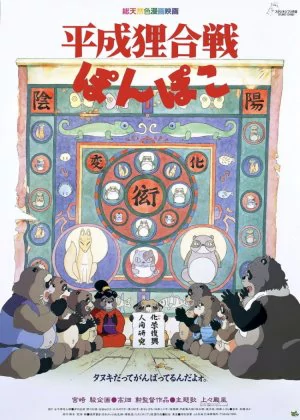Pom Poko

I think I've seen most Ghibli films at least twice now, Isao Takahata's Pom Poko [Heisei Tanuki Gassen Ponpoko] probably being the most notable exception. I couldn't tell you why, even if I wanted to. It's certainly not my favorite Takahata, nor a top tier Ghibli, but I only had pleasant memories of that first viewing, more than 2 decades ago. And so it was time to get myself reacquainted with this somewhat lesser known Ghibli. Maybe it was the somewhat lower expectations that made a difference, but it's no doubt one of their most underestimated films.
![screen capture of Pom Poko [Heisei Tanuki Gassen Ponpoko]](/thumbs/img/articles/1200xauto/pom-poko-1.webp)
Though Ghibli is often seen as a very singular studio, there is quite a big difference between the films of Miyazaki and Takahata. The art style may appear very similar, Takahata brings an extra level of maturity to his films that is rarely found elsewhere, even when said film is about shape-shifting raccoons. The eco themes that lie at the core of Pom Poko too are handled very differently, with more respect for humanity's struggles, though without ever diluting the core message of the film. That's a skill many of the biggest and most lauded directors never managed to master.
The shapeshifting raccoons are no doubt the highlight of the film. While this many sound like a somewhat haphazard piece of fantasy, shapeshifting animals are pretty common in Asian folklore. Less commonly known is the well-documented, explicit and multifunctional use of their scrotums. This isn't just some random, throwaway plot element either, Takahata even dedicates an entire song to this very particular skill. What could've been an inappropriate and crude comedy bit, is handled with surprising glee and stature, turning it into one of the most memorable elements of the film.
The plot revolves around two groups of raccoons. After being forced out of their homes by human redevelopment plans, they get into a spirited conflict over a new piece of land. The conflict escalates, but one of the elders manages to calm things down. Rather than fight each other, the two groups decide to work together. They're reviving their old shapeshifting skills to freak out the human invaders. While early guerilla attacks are pretty successful, they quickly learn that humans don't give up that easily, and that they'll have to come up with a bigger plan to deter the people from continuing their housing project.
![screen capture of Pom Poko [Heisei Tanuki Gassen Ponpoko]](/thumbs/img/articles/1200xauto/pom-poko-2.webp)
The animation quality is once again exceptional, which is pretty much par for the course. The nice thing is that Ghibli's attention to detail never really tires. Though Pom Poko is close to three decades old, it still looks pretty impressive compared to modern anime features. The colors are bright and powerful, the raccoons are characteristic and recognizable, the fantastical creations (the Yokai parade in particular) very well executed, and the animators never skimped on the animation, even though the film is close to two hours long. It's not quite as distinctive or boundary-pushing as Takahata's later films, but when a film looks this good, I really can't complain.
Like most Ghibli films, the soundtrack is of high quality too, but not quite as memorable. There are some songs that stand out lyrically (the aforementioned scrotum song being the most obvious example) and the soundtrack fits the film perfectly, catching the right moods at the right time. It's just that the music never takes center stage. Like most Ghibli films, it plays second fiddle to the visuals. The dub on the other hand is nigh perfect. Distinctive voice work creates exactly the right vibe, perfectly balancing the lighter moments with the character's more life-threatening challenges. That is, if you stick with the original dub, as the US version is its predictably abominable self.
![screen capture of Pom Poko [Heisei Tanuki Gassen Ponpoko]](/thumbs/img/articles/1200xauto/pom-poko-3.webp)
Pom Poko isn't the first film to tackle humanity's insatiable hunger for claiming habitats of animals, but it is by far one of the most mature ones. Not because it is overly tragic, dark or depressing, instead Takahata's sense of realism is what sets this film apart from its peers. The film doesn't offer a typical good guy/bad guy narrative, instead you get a much more nuanced struggle for survival. One that features literal and symbolic transformations in order to survive a changing ecosystem. And that truly is a breath of fresh air.
Pom Poko isn't just a single-minded eco-document either, Takahata still finds time for cinematic wonder. In the great tradition of stand-out anime features, there is a magnificent parade sequence that exist almost exclusively for showing off Ghibli's animation skills. A few other scenes like this are spread throughout the film. They don't necessarily do much to advance the plot, and they do drag out the runtime, at the same time these moments easily stand out as the most memorable and charming. They might bug people with a tighter narrative focus.
Not that Takahata needed any more proof that he was one of Japan's prime anime directors, Pom Poko also isn't his best work, but it's a delightful film that once again showcases his unique talent. He delivers a rather tricky and thorny topic with the proper nuance and depth, sugarcoats it with excellent animation and a proper score, and makes sure it remains entertaining from start to finish. And for a 28-year-old film, it still feels relevant and fresh, as if it was released just yesterday. If you haven't seen this one yet, do yourself a favor and get on it as soon as possible.